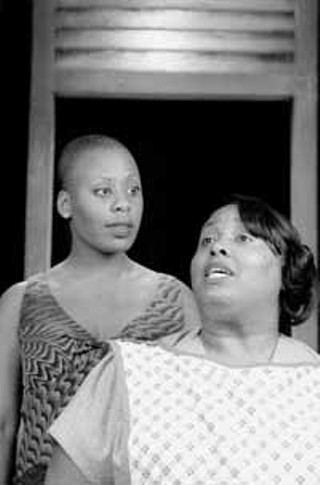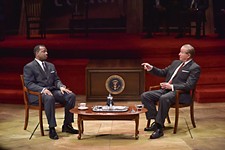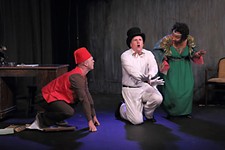bee luther-hatchee
Local Arts Reviews
Reviewed by Robert Faires, Fri., Aug. 9, 2002

bee luther-hatchee: Are the Stars Out Tonight?
Zachary Scott Theatre Center Whisenhunt Arena Stage,
through September 1
Running time: 1 hr, 45 min
To most of us here on Earth, stars may appear to be objects of beauty and wonder, celestial illumination reaching us across impossible distances and spans of time. But to someone who has stepped off the train to the Afterlife in bee luther-hatchee -- in African-American folklore, "the stop after hell" -- they're sights to chill your blood. As the Devil tells a woman named Libby Price in a dream she has, each star is a soul caught in a jar and set in the sky, able to see the other souls in the heavens but unable to connect with any of them.
For Shelita Burns, the protagonist in Thomas Gibbons' engaging, thought-provoking play bee luther-hatchee, a hotel room in Charlotte comes to feel like her very own jar in the sky above the stop after hell. The New York editor, who made her mark in publishing with a series of nonfiction books that reclaim African-American voices "from the silence," comes south to meet the woman who gave the series its greatest success: the selfsame Libby Price, whose memoir became a bestseller, won a major award, and spoke to Shelita so profoundly that she is driven to "complete the connection" that started when she first read Libby's manuscript. But what Shelita learns in that room removes forever the possibility of further connection with Libby and threatens her career, the series, and her emotional well-being. She is cut off from what means the most to her, isolated, alone.
How this comes to pass is best discovered through the play; Gibbons delivers a number of revelations that surprise with an almost giddy thrill, but they also directly affect the way we see and respond to the characters, and the constant shift in perspective is one of the play's artistic strengths. It keeps us off-balance, unable to find a spot to land until the play's final moment -- and not really even then. Suffice to say that if Shelita is in a bee luther-hatchee of her own, the "devil" in the scenario is the person who comes to her hotel room bearing information about Libby and her book. He is a white man. And that is crucial to everything that follows.
The arrival of this man, Sean Leonard, sparks a debate over voices: white and black, female and male. Who is allowed to speak for whom? Is it fair for someone of one gender or race to assume the voice of another, to tell the other's story? Does it matter if the result reflects an emotional or spiritual truth that would be evoked by an authentic voice? Or does the weight of history make a difference? Can you ignore centuries of injustice and oppression suffered by a people at the hands of another? Does it reserve for that community the right to tell its own story? These questions are raised by the characters with fervor of people arguing for their lives, which in a sense they are.
Not six months ago, these very questions were raised with an identical passion not a hundred yards from the theatre staging this play. In a Parks and Recreation Department meeting room, adjacent to the Zachary Scott Theatre Center, a public furor erupted over the selection of new public art for the George Washington Carver Museum and Library. Three artists had been recommended for the project, but once neighbors and friends of the Carver learned that none of the artists were African-Americans, they lobbied the Arts Commission to restart the process. The museum exists to tell the story of Austin's African-American community, they protested, and filling it with public artwork by artists outside that culture was allowing someone else to tell their story. When Shelita tells Sean that no one has the right to tell someone else's story, that African-Americans have to own their past, it eerily echoes this spring's Arts Commission debate.
It's rare for a piece of theatre staged in Austin to touch an issue this close to the city's heart, and that immediacy by itself recommends the play. But what makes this Zach production still more worthy of your attention is the skill with which it serves up the thorny issues at its core. What could be little more than a polemical exchange, a point-counterpoint of the kind crowding the airwaves on Sunday morning TV, is, as staged by Ann Ciccolella, a struggle of characters, with very personal stakes. We grasp the urgency of the outcome to Stacy Robinson's Shelita and Paul Parente's Sean. Robinson casts her character in the cool assuredness of the rising professional, composed to the point that she fights back tears, but when confronted by Leonard with news that shatters her dreams, she cuts loose with a fury untamed. Parente's Leonard is by nature a nebbish -- slicked-down hair, glasses, and a posture best described as a perpetual cringe -- but he too finds a strength to match his opponent and parry her verbal attacks. And in the recurring presence of Libby, embodied here by the ever-soulful Janis Stinson, her voice like the smoke Libby says her soul is made of, we see and feel the individual who has touched these two very different people in such similar ways.
The play, like the debate over the art for the Carver, sets art against history in an attempt to say what's fair in the debates over authenticity of voice and artistic representation. The thing is, neither art nor history are models for fairness. Art insinuates itself into our hearts, stirring our souls, without regard for our personal backgrounds or political leanings. Boundaries are pointless where art is concerned; it exists to connect with us however it will. History is like a force of nature, a tide in which we mark the ebb and flow of oppressor and oppressed. Where do you draw the line for one class of people that does not impinge on or cross the line of another class?
The questions raised in bee luther-hatchee can never be settled, but they must be considered. The points of view must be articulated, as they are here, and listened to if we are ever to achieve any kind of compromise or resolution when these matters rise up among us -- and make no mistake, they will arise again, and they will continue to do so for generations to come. If we fail to talk about them, to ponder what each side stands for and what it means to us as a community, we risk becoming like those stars in the play's vision of bee luther-hatchee: souls separated by light years of darkness, by a void.
We might not find answers in Morgan's play or Zach's production, but at least we can see in them how differently stars can look depending on where you stand.










